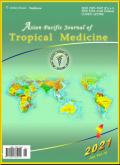Risk estimation of chronic kidney disease in a leptospirosis endemic area: A case-control study from south Andaman Islands of India
IF 1.6
4区 医学
Q3 PUBLIC, ENVIRONMENTAL & OCCUPATIONAL HEALTH
引用次数: 0
Abstract
Objective: To estimate the risk of chronic kidney disease in patients with leptospirosis. Methods: All reported (41 890) and later confirmed leptospirosis (1 990) cases from 2010-2020 were traced by universal sampling. 386 Laboratory-confirmed leptospirosis cases were enrolled and 413 age, gender, area, and occupation matched healthy persons were included as controls. Variables including socio-demographic characteristics, medical history, and health-related behaviours were compared between the two groups and association between these variables and reduced estimated glomerular filtration rate (eGFR) was analyzed with multiple linear regression. Results: The median of eGFR was 49.0 (27.0, 75.0) mL/min/1.73 m 2 in the cases and 96.0 (72.0, 121.0) mL/min/1.73 m 2 in the controls, showing significant differences ( P <0.001). Bivariate analysis showed that leptospirosis seropositivitiy, repeat leptospirosis infection, diabetes, male gender, working in field (sun exposure), COVID-19 infection and smoking had statistically significant association with reduced eGFR. Leptospirosis seropositivity had negative effects on eGFR. Multiple linear regression confirmed that leptospirosis seropositivity had negative effects on eGFR (unstandardised p coefficients= −30.86, 95% CI −49.7 to −11.9, P <0.001). Conclusions: Chronic kidney disease is a complex disease with multiple risk factors involved. Exposure to leptospirosis is one of the essential factors in accelerating its progression.钩端螺旋体病流行地区慢性肾脏疾病的风险评估:来自印度南安达曼群岛的病例对照研究
目的:评估钩端螺旋体病患者发生慢性肾脏疾病的风险。方法:对2010-2020年报告病例(41 890例)和后来确诊的钩端螺旋体病病例(1990例)进行普遍抽样调查。纳入386例实验室确诊的钩端螺旋体病病例,并纳入413名年龄、性别、地区和职业相匹配的健康人作为对照。比较两组患者的社会人口统计学特征、病史和健康相关行为等变量,并用多元线性回归分析这些变量与肾小球滤过率(eGFR)降低之间的关系。结果:实验组eGFR中位数为49.0 (27.0,75.0)mL/min/1.73 m2,对照组为96.0 (72.0,121.0)mL/min/1.73 m2,差异有统计学意义(P <0.001)。双因素分析显示,钩端螺旋体病血清阳性、重复感染、糖尿病、男性、田间工作(日晒)、COVID-19感染和吸烟与eGFR降低有统计学意义。钩端螺旋体病血清阳性对eGFR有负面影响。多元线性回归证实,钩端螺旋体病血清阳性对eGFR有负面影响(未标准化p系数= - 30.86,95% CI为- 49.7至- 11.9,p <0.001)。结论:慢性肾脏疾病是一种复杂的疾病,涉及多种危险因素。接触钩端螺旋体病是加速其发展的重要因素之一。
本文章由计算机程序翻译,如有差异,请以英文原文为准。
求助全文
约1分钟内获得全文
求助全文
来源期刊

Asian Pacific journal of tropical medicine
PUBLIC, ENVIRONMENTAL & OCCUPATIONAL HEALTH-TROPICAL MEDICINE
CiteScore
4.00
自引率
9.70%
发文量
1936
审稿时长
3-8 weeks
期刊介绍:
Asian Pacific Journal of Tropical Medicine (ISSN 1995-7645 CODEN: APJTB6), a publication of Editorial office of Hainan Medical University,is a peer-reviewed print + online Monthly journal. The journal''s full text is available online at http://www.apjtm.org/. The journal allows free access (Open Access) to its contents and permits authors to self-archive final accepted version of the articles on any OAI-compliant institutional / subject-based repository.
APJTM aims to provide an academic communicating platform for international physicians, medical scientists, allied health scientists and public health workers, especially those of the Asia-Pacific region and worldwide on tropical medicine, infectious diseases and public health, and to meet the growing challenges of understanding, preventing and controlling the dramatic global emergence and re-emergence of infectious diseases in the Asia-Pacific.
The journal is proud to have an international and diverse editorial board that will assist and facilitate the publication of articles that reflect a global view on tropical medicine, infectious diseases and public health, as well as emphasizing our focus on supporting the needs of public health practitioners. The APJTM will allow us to seek opportunities to work with others who share our aim, and to enhance our work through partnership, and to uphold the standards of our profession and contribute to its advancement.
 求助内容:
求助内容: 应助结果提醒方式:
应助结果提醒方式:


